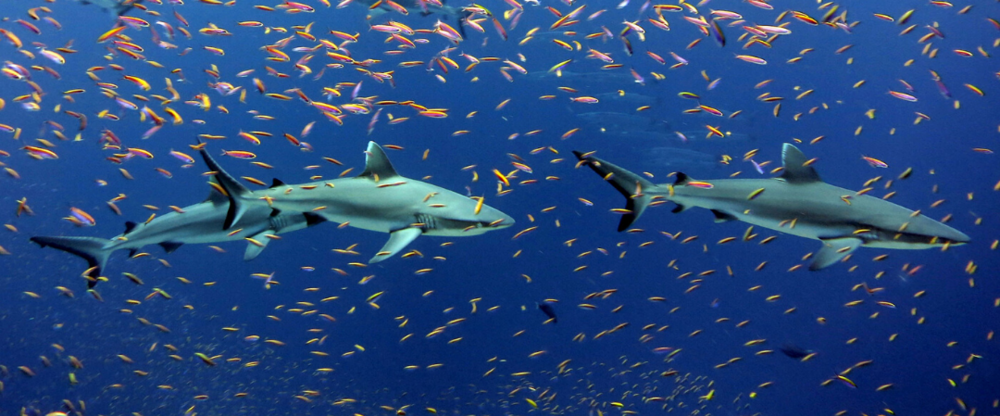
Illegal fishing: an existential threat for sharks and the oceans
Sharks are a vital and ancient part of the marine ecosystem. They have been around longer than the dinosaurs and play a vital role in keeping their environments healthy, but illegal fishing is a threat to their survival. Hear more about our work defending these amazing creatures here.
For over 400 million years, sharks have played an important role in the health of marine ecosystems across the globe. They maintain balance in fish populations, removing sicker, weaker individuals and preventing any single species from becoming dominant.
Illegal fishing vessels often specifically target sharks. Fewer sharks on reefs means more mid-sized carnivores, which feed on herbivorous fish. As the populations of these smaller fish collapse, algae blooms and out-competes the corals for space, sunlight and nutrients.
This can cause the corals - already threatened by climate change and pollution - to degrade and die.
Similarly, without sharks, seagrass ecosystems can be over-grazed by herbivores like manatees. Sharks keep manatees on the move, meaning that no one area is stripped bare. This keeps these essential ecosystems thriving and provides a nursery for the young of many fish species.
Without sharks, ecosystems which are essential to wildlife and to humans would be changed beyond recognition and could disappear.
Finning, fishing and extinction
Sharks are being targeted by vessels fishing illegally, which is having devastating impacts on ecosystems and threatening many species with extinction. According to the International Union for Conservation of Nature, a quarter of sharks, and their close relatives rays, are threatened with extinction.
Much of the population decline can be attributed to human activity, with 90% of the world’s largest marine fish (including sharks) having been lost since industrial fishing began in the 1950s. Sharks are particularly vulnerable to overfishing due to their slow maturation and low rates of reproduction.
One of the most disturbing fishing practices is shark-finning, an appalling practice in which sharks are caught and have their fins removed (for delicacies such as shark-fin soup) before being tossed back into the ocean.
There, they sink to the bottom and, unable to swim, slowly suffocate. It produces shocking amounts of needless waste, coupled with carnage and cruelty on an untold scale; all for such a tiny piece of the shark.
EJF has revealed that shark finning is conducted routinely on an industrial scale. The crew from Taiwanese ships EJF investigated caught and finned tens of thousands of sharks, killing dolphins for bait in the process.
Although the practice is illegal under Taiwanese law, these rogue vessels were able to easily evade port inspections. The crew were able to offload the fins for onward sale, including those from vulnerable species such as the smooth hammerhead.
There has been some hopeful progress with news of the Taiwanese government committing to action on illegal fishing, but there is still much to be done worldwide. Sharks continue to face worryingly rapid population declines, unjust persecution and calculated targeting.
How to fix it
The recent landing of an elusive Megamouth in Liberia, only recorded for 103rd time ever, reminds us how poorly understood and potentially vulnerable some shark species are.
This knowledge gap is being addressed as part of Liberia’s National Plan of Action to protect sharks and rays, developed after consultation with EJF. Careful monitoring of sharks is a first step. In Liberia, data is currently very sparse, but threatened shark species are known to be present.
Building a better understanding of their populations will help protect these vulnerable animals. This safeguards not just sharks but the marine ecosystems which depend on them.
On a global scale, EJF is calling for all countries to adopt and enforce protections for sharks. The first vital step is creating transparency in fisheries, to bring the illegal fishers catching sharks out of the shadows and enforce laws against these crimes.
We are also calling for a high seas treaty to protect 30% of the ocean by 2030. Scientists have warned that we only have around 10 years left to reduce our impacts on the oceans or we risk catastrophic mass extinctions. To avoid disaster, we need to act now.
Illegal fishing remains rife in much of the world. If overfishing of top predators like sharks is allowed to go on undeterred, entire ecosystems and the millions of people that depend on them will suffer immensely.
Cover image courtesy of NOAA's National Ocean Service, reproduced here under a Creative Commons License.
SIGN UP FOR OUR EMAILS AND STAY UP TO DATE WITH EJF